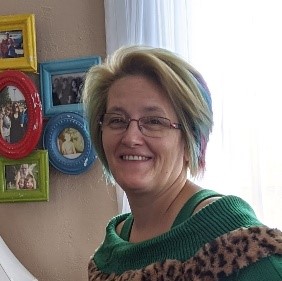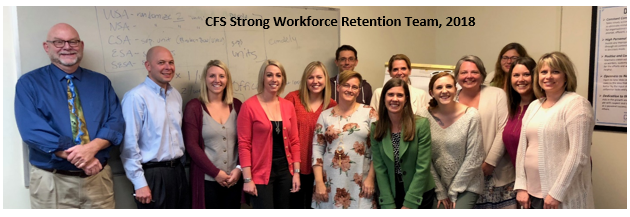My Experience with CFS Strong
By Lana Sayre, CFS Supervisor
I am a child and family services specialist supervisor with the Nebraska Department of Health and Human Services. A few years ago, I volunteered to take over for another member of the workforce retention team that was working with the QIC-WD to develop/select an intervention that Nebraska could implement to reduce employee turnover among child and family services specialists (CFSS), our frontline worker position.
Employee retention is a constant, ongoing challenge. Our work is challenging and very stressful. You have to be an expert in child safety and have a broad understanding of all of the issues which affect the children and families we serve—physical abuse, sexual abuse, physical and emotional neglect resulting from mental health or substance use issues of the parents, domestic violence (which impacts the children), and more. For most of the CFSS staff, this is their first professional position and the challenges, pressures, and expectations of the job force staff to deal with primary and secondary traumatic stress on a daily basis.
As we created CFS Strong, every person on the workforce retention team was fully invested in the project and spoke honestly and passionately about the issues that face frontline staff. We discussed the need for this intervention to be seen as a culture shift in the agency. We also talked about how difficult it is to have staff take time out of their workday to participate in something “extra.” We really struggled to make sure that the intervention selected (and modifications made) were the best choice for Nebraska workers.
When we arrived at the decision to implement a modified version of Resilience Alliance (RA), I was so excited because I felt we selected an intervention that would really help our staff. RA focuses on 6 core concepts: optimism/positivism, collaboration, mastery, self-awareness, self-reflection, and self-care. These concepts are repeated over the course of the intervention. I believed RA would provide staff with the skills that will make the work we do less burdensome.
To study the impact of the intervention, the QIC-WD randomly assigned half of the teams in the state to participate in RA. I was lucky enough to be randomly selected to receive the intervention. Meeting weekly with my team and another supervisory team, allowed all of us to learn and practice coping skills which increased our individual and team resilience. We also have a shared language related to resilience that we use to discuss how we are handling day-to-day and crisis-related stressors. RA helped us build trust within the group, as most were willing and able to share their vulnerability in an effort to learn or help others learn.
I am not sure what the end result of the study will be, but from my perspective, CFS Strong should be implemented (with some modifications based on our lessons learned) statewide and on an ongoing basis.

